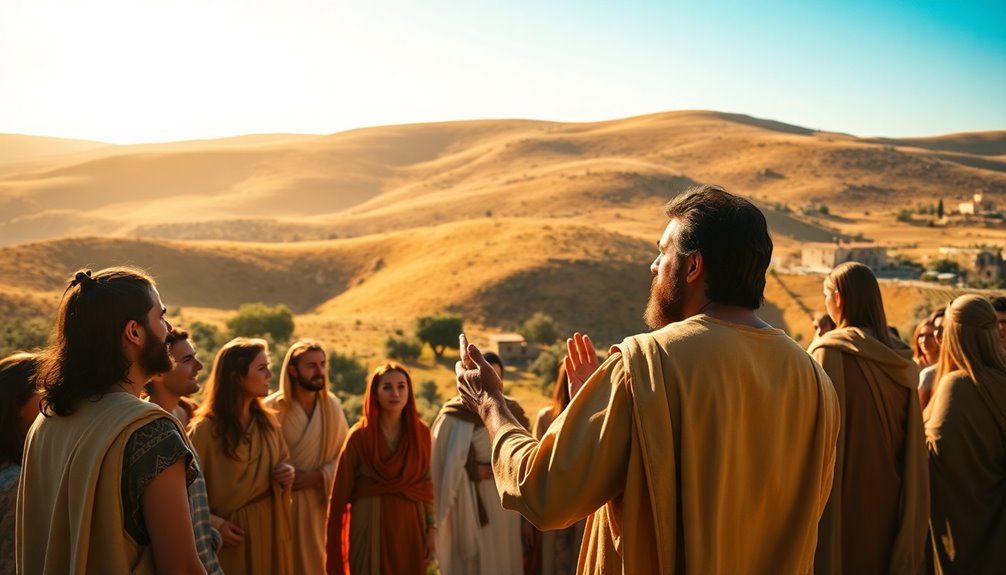The Kingdom of God is a spiritual reign where God's authority guides your heart. It's about living with love, humility, and justice rather than seeking earthly power. Jesus discussed the Kingdom frequently, showing it's both a present reality and a future hope. Many misunderstand it as a physical place, but it's defined by principles like righteousness and peace. As a citizen of this Kingdom, you prioritize your relationship with Christ above all. To truly grasp its depth and transformative power, you might find it enriching to explore its scriptural insights and practical applications further.
Key Takeaways
- The Kingdom of God represents divine authority and spiritual rule within the hearts of believers, prioritizing God's will over earthly institutions.
- It is characterized by principles of humility, love, justice, peace, and righteousness, rather than political power or physical realm.
- The Kingdom is both a present reality and a future hope, as Jesus proclaimed its nearness during his ministry.
- Key scriptures, like Romans 14:17, describe the Kingdom as being about righteousness, peace, and joy in the Holy Spirit.
- Daily practices such as prayer, gratitude, and community fellowship are essential for living as citizens of the Kingdom and embodying its values.
Introduction

The concept of the Kingdom of God invites profound reflection on how divine authority shapes our lives. Jesus emphasized this theme throughout His ministry, mentioning the kingdom of God over 90 times in the Gospels and Acts. It's not about a physical realm; instead, it represents a spiritual rule where God's reign takes precedence in the hearts of believers.
As you explore the teachings of Jesus, you'll discover that the Kingdom is characterized by principles like humility, love for neighbors, and the redemption of the lost.
Living as a citizen of the kingdom of God means prioritizing your allegiance to God's rule above earthly nations. Your actions should embody the values of the Kingdom, showcasing the transformative power of faith and obedience.
This internal change reflects God's sovereignty in your life and the lives of those around you. The essence of the Kingdom encourages you to seek a deeper relationship with God, allowing His will to guide your decisions and interactions.
Scriptural Insights on Kingdom

When you explore the Kingdom of God in Scripture, you'll notice its frequent mention, especially in the Gospels.
Key references in books like Matthew highlight its significance in Jesus' teachings, emphasizing both its spiritual nature and ethical implications.
Primary Bible References
Throughout the Gospels, the Kingdom of God appears a remarkable 126 times, underscoring its vital role in Jesus' teachings. In the New Testament, key verses like Mark 1:15 and Luke 17:20 emphasize the nearness of the Kingdom and its spiritual nature, urging you to embrace repentance and transformation.
Jesus calls on His followers to seek first the Kingdom of God and its righteousness in Matthew 6:33, highlighting the importance of prioritizing God's reign in your life.
Additionally, Romans 14:17 describes the Kingdom of God as characterized by righteousness, peace, and joy in the Holy Spirit, reflecting its internal dimensions.
The gospel of Matthew also includes powerful parables, such as the Mustard Seed (Matthew 13:31-32), illustrating the Kingdom's growth from small beginnings to a significant impact.
These references collectively reveal that the coming of the Kingdom isn't just about external events; it's a profound spiritual reality that calls for your active participation.
Understanding these primary Bible references helps you grasp the dynamic nature of the Kingdom of God and encourages you to align your life with its transformative principles.
Secondary Bible References
Numerous secondary Bible references further illuminate the concept of the Kingdom of God, enriching your understanding of its significance. The Gospels highlight this theme extensively, with 126 mentions in their narratives alone.
In Matthew 4:17, Jesus announces the nearness of the Kingdom, prompting you to reflect on its imminent reality. Luke 17:20-21 emphasizes that the kingdom of God isn't a distant physical realm but an internal transformation within you.
Romans 14:17 captures the essence of God's reign, describing it as characterized by righteousness, peace, and joy in the Holy Spirit. This paints a picture of the Kingdom as a spiritual state rather than a political entity.
Additionally, in Mark 1:15, Jesus taught that repentance is vital for entering the Kingdom, highlighting the transformative journey of becoming a citizen of God's reign.
The Lord's Prayer also encapsulates this desire for divine authority, particularly in Matthew 6:10, where you pray for God's kingdom to come. This ongoing petition reflects your yearning for God's governance in your life and the world, reinforcing the central role the Kingdom of God plays in your faith.
First-Century Jewish Expectations

The fervent anticipation of the Kingdom of God among first-century Jews was shaped by deep-rooted Old Testament prophecies, which spoke of a coming Messiah destined to restore Israel. Many were looking for a political and military leader who'd overthrow Roman oppression and re-establish the Davidic kingdom, reflecting their desire for national sovereignty.
Apocalyptic literature, like the Book of Daniel, fueled expectations of a divine intervention to bring about this Kingdom.
However, with the arrival of John the Baptist and later Jesus, there was a significant shift in understanding. Both emphasized themes of repentance and moral renewal, highlighting that the kingdom of God wasn't just about political power but also about spiritual transformation.
Jesus' teachings introduced a new perspective, focusing on the Kingdom's internal dimensions, which challenged the prevailing Messianic expectations. Instead of a conqueror, He presented Himself as a humble servant, inviting people to embrace a different kind of reign—one characterized by love, forgiveness, and personal change.
This redefinition of the Kingdom of God compelled first-century Jews to reconsider their hopes and aspirations, paving the way for a deeper understanding of God's plans for humanity.
Cultural Context of Kingdom

As you explore the cultural context of the Kingdom of God, it becomes clear that this concept is deeply intertwined with Old Testament teachings about God's sovereignty and the expectations of Second Temple Judaism.
In Jesus' time, the kingdom of God resonated with Jewish hopes for a Messianic figure who'd restore Israel and establish God's reign on earth. This longing for divine intervention shaped how the people understood their relationship with God and each other.
The Gospel of Matthew frequently uses the term "Kingdom of Heaven," reflecting Jewish customs that avoided using God's name directly. This emphasis highlights a distinct heavenly realm where God's authority is paramount.
Jesus utilized familiar cultural themes and everyday experiences in His parables, making the nature of the Kingdom relatable to His audience.
Furthermore, ancient cultures viewed notions of sovereignty, authority, and communal ethics as integral to understanding God's reign. These perspectives influenced early Christian interpretations of the kingdom of God and how believers were called to live in alignment with this divine authority.
Ultimately, the cultural context in which Jesus spoke enriched the understanding of the Kingdom and its implications for His followers.
Misunderstanding Kingdom's Nature

You might think the Kingdom of God is just a future promise or a physical place, but that's a narrow view.
It's essential to understand that the Kingdom is a present reality that transforms lives and invites everyone to be part of it.
Debunk Common Misconceptions
Misunderstandings about the Kingdom of God can lead many astray, creating a distorted view of its true nature. One common misconception is seeing the kingdom as a physical realm, but it's actually about God's reign in the hearts of believers (Luke 17:20-21).
Some people think the kingdom is merely a future event, overlooking that Jesus proclaimed its present reality during His ministry, calling for repentance and transformation (Mark 1:15).
Additionally, the kingdom isn't defined by political power or worldly structures. Instead, it embodies justice, peace, and righteousness, transcending cultural and national boundaries (Romans 14:17).
Many equate the kingdom with church institutions or traditions, but true citizenship involves personal allegiance to Christ and living out His principles daily (Philippians 3:20).
Lastly, the "already, but not yet" nature of the kingdom highlights the tension between its current presence and future fulfillment, often leading to confusion about its complete realization (Matthew 6:10).
Misinterpretation of Kingdom's Timing
The timing of the Kingdom of God is often misinterpreted, leading many to view it solely as a future promise rather than recognizing its present reality. This misunderstanding stems from the belief that God's reign is a distant event, overlooking the "already, but not yet" aspect of the Kingdom.
When Jesus initiated His ministry, He proclaimed that the Kingdom was already at hand (Luke 11:20), calling for repentance and a transformation of life (Mark 1:15).
Many people confuse the Kingdom with a political or earthly state, forgetting Jesus' clarification that His Kingdom isn't of this world (John 18:36). This misinterpretation can cause you to focus excessively on external signs and events, neglecting the internal change that defines true citizenship in the Kingdom (Romans 14:17).
Understanding the Kingdom's timing requires recognizing it as both a present reality and a future hope. You must embrace the tension of living in a world where God's reign is already present but awaits its full realization.
Daily Kingdom-Focused Practices

To truly align your life with the Kingdom of God, daily prayer for guidance is essential.
Connecting with others in small groups not only strengthens your faith but also fosters a sense of community.
Together, these practices can transform your understanding and experience of God's reign in your life.
Daily Prayer for Guidance
Daily prayer for guidance is crucial for aligning your life with the principles of the Kingdom of God. When you take time each day to seek God's direction, you open yourself to His wisdom and insight. Matthew 6:33 encourages you to "seek first the kingdom," reminding you that prioritizing God's reign in your life leads to fulfillment and purpose.
Incorporating scripture into your daily prayer helps reinforce a Kingdom-focused mindset. Reflecting on specific verses can guide your thoughts and actions, ensuring they align with God's will.
Practicing gratitude during your prayers cultivates a heart that embodies the values of the Kingdom, such as humility and love for others. You can also engage in community prayer with fellow believers, which fosters unity and strengthens your collective pursuit of Kingdom goals.
Remember, the Kingdom thrives in relationships, and praying together enhances that bond. Finally, daily reflection on your actions and attitudes in light of Kingdom teachings encourages continual growth and transformation, allowing you to manifest God's reign more profoundly in your life.
Make daily prayer a priority, and watch how it aligns your heart and actions with the Kingdom of God.
Fellowship in Small Groups
How can fellowship in small groups transform your spiritual journey? Engaging in small group fellowship nurtures your growth as a citizen of the kingdom of God.
These intimate settings offer a supportive environment where you can practice daily activities that reflect Kingdom values. By participating in collective prayer and studying Scripture, you can deepen your understanding of love, justice, and humility, which are essential to living out your faith.
Regularly gathering with fellow believers allows you to share experiences and testimonies, enhancing your awareness of God's work in your life and the lives of others. This connection reinforces your faith and creates accountability among members.
Additionally, small groups encourage acts of service and outreach, aligning your actions with the Kingdom's mission.
As Jesus taught, loving one another is vital. Through small group fellowship, you build relationships that embody this communal aspect, fostering a sense of belonging and support.
Ultimately, these gatherings empower you to embody the principles of the kingdom of God in your daily life, transforming your spiritual journey and impacting those around you.
Kingdom's Transformative Power Revealed

The transformative power of the Kingdom of God is evident in the lives of those who embrace its principles. When you experience a new birth through repentance and faith in Christ, you begin to live as a citizen of this Kingdom, marked by a profound internal change.
Jesus teaches that the Kingdom's transformative power stands in stark contrast to worldly values, emphasizing justice, peace, and righteousness (Romans 14:17).
Consider the parable of the Mustard Seed; it starts small but grows into something great (Matthew 13:31-32). This reflects how God works in your life and community, bringing about significant transformation over time.
As a citizen of the kingdom of God, you're called to actively demonstrate this transformative power through acts of love, service, and justice (Matthew 5:14-16).
While the Kingdom is already at work within you, its full realization is yet to come with Christ's return (Philippians 1:6). This good news encourages you to participate wholeheartedly in the transformative journey, both personally and collectively, as you witness the unfolding of God's Kingdom in your life and the lives of those around you.
Additional Resources

As you embrace the transformative power of the Kingdom of God, you might seek additional resources to deepen your understanding and bolster your journey. Start by exploring the Gospels, where the concept of the kingdom is central to Jesus Christ's teachings. With over 126 mentions, these passages reveal the significance of prioritizing the kingdom in your daily life.
Consider studying Matthew 6:33, which emphasizes seeking the kingdom first and living out its principles of righteousness and humility. You can also reflect on the Lord's Prayer, especially the line "Your kingdom come," as a reminder of both the present spiritual reign and the future physical manifestation of God's kingdom.
Delve into the parables, like the Mustard Seed in Matthew 13:31-32, to grasp how the kingdom grows from small beginnings into something transformative.
Additionally, engaging in community service and fostering new allegiances to Christ will help you embody the kingdom's values. By utilizing these biblical resources, you'll gain deeper insights into the Kingdom of God and its call for internal transformation in your life.
Frequently Asked Questions
What Is Kingdom of God According to Bible?
When you explore the concept of the Kingdom of God in the Bible, you discover it represents God's sovereign reign over creation.
It invites you to experience His authority in your life through repentance and acceptance of Jesus as Lord. As you align your values with the Kingdom's principles, you embody justice, peace, and righteousness.
Ultimately, you're called to live as a citizen of this Kingdom, prioritizing God's reign above all earthly concerns.
What Truly Is the Kingdom of God?
When you think about the Kingdom of God, consider it a transformative way of living that reflects God's authority.
It emphasizes justice, peace, and righteousness in your daily life. Rather than a physical place, it's about embodying values like servanthood and humility.
You're invited to participate by acknowledging Christ's lordship, which requires genuine repentance and an internal change.
How Did Jesus Describe the Kingdom of God?
Jesus described the Kingdom of God as a present reality, urging you to embrace repentance and transformation in your life.
He emphasized that it's not a physical place, but rather a spiritual reign that exists within believers.
Through parables like the Mustard Seed, He illustrated how it grows from small beginnings.
Jesus taught that the Kingdom belongs to the humble, encouraging you to seek it above all worldly concerns.
What Did Jesus Mean the Kingdom of God Is Within You?
When Jesus says, "the Kingdom of God is within you," He's emphasizing that it's not about external signs or physical realms.
Instead, it's a spiritual reality that exists in your heart. This means you carry God's reign inside you, and it calls for a transformation of your spirit.
Embracing this truth encourages you to embody love, humility, and righteousness in your daily life, fostering a deeper relationship with God and reflecting His will.










